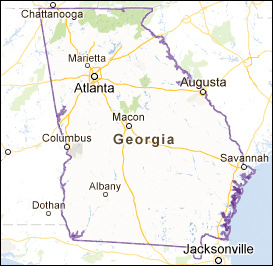By Jim Ellis
Feb. 1, 2022 — The Atlanta Journal-Constitution (AJC) released one of their regular Georgia statewide polls that the School of Public and International Affairs from the University of Georgia administers (Jan. 13-24; 872 registered Georgia voters, live interview) and the results reflect an electorate with some conflicting views.While President Biden’s job approval ratio has taken a steep dive since the news entity’s May 2021 survey was published, and the right track/wrong track question is heavily lopsided toward the negative, the current statewide office holders and even the state legislature land in the positive approval realm. Yet, in the accompanying ballot test numbers, the tested Democratic officials are trailing despite brandishing the relatively positive approval ratios.
President Biden now records a combined 34:61 percent favorable to unfavorable index (13 percent strongly approve; 21 percent somewhat approve; 11 percent somewhat disapprove; 50 percent strongly disapprove), which is a huge net reduction of 32 percentage points from his combined 51:46 percent score in May (28 percent strongly approve; 23 percent somewhat approve; 9 percent somewhat disapprove; 37 percent strongly disapprove).
In the new January poll, the respondents believe, in a very poor 17:71 percent ratio, that the country is on the wrong track. They also feel Georgia is headed in the wrong direction, but with less intensity, 34:48 percent negative. The May AJC poll, with a shorter questionnaire, did not ask similar track questions.
The sense of the nation figures in the January study, however, also seem inconsistent with how these same respondents rate their elected federal officials. Sens. Raphael Warnock (D) and Jon Ossoff (D) record 44:35 percent and 43:35 percent positive ratios, respectively. This tells us that the sampling universe members don’t hold their senators particularly responsible for the country being on the perceived wrong track.
In another inconsistency, the senator who is on the 2022 ballot, Rev. Warnock, actually trails his prospective general election opponent, former Georgia and NFL football star Herschel Walker (R), despite the positive job approval sentiment. In this AJC poll, Walker holds a 47-44 percent lead. This latter finding is also consistent with a recent Quinnipiac University study (Jan. 19-24; 1,702 registered Georgia voters, live interview) that gave the challenger an edge, but with a smaller 49-48 percent split.
The governor’s numbers show a similar inconsistency. In Gov. Brian Kemp’s (R) case, while the state is viewed as headed in the wrong direction, the chief executive does not appear to be shouldering an excessive amount of blame. His job approval lies in the positive realm at 49:43 percent favorable to unfavorable. Paired with his likely general election opponent, 2018 gubernatorial nominee and former state House Minority Leader Stacey Abrams (D), Kemp leads 48-41 percent.



